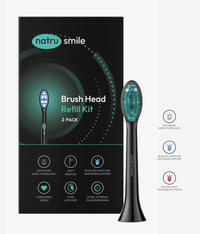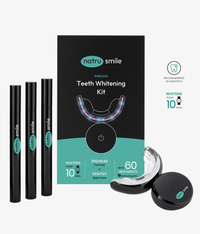
All products are certified by dental expert Dr. Greg Grillo
Among the adult population, around 90% have dealt with at least one cavity.
Cavities (also called dental caries) are the most common dental condition in the world, and sometimes they can be painful, expensive to treat, and even lead to tooth loss if not caught in time.
But most of these cases are preventable. With a simple shift of focus, you can learn how to prevent cavities and maintain your oral health.
Although some cases may seem random or unavoidable, these seven tips will help you minimize your risk of developing cavities.
1. Brush Your Teeth Regularly (With Fluoride Toothpaste)
If you're serious about protecting the health of your oral cavity (i.e., your mouth), the most important thing to do is brush your teeth on a regular basis.
A combination of bacterial plaque and the frequent consumption of sugary or acidic foods causes cavities. This combination creates an acidic environment in the mouth that gradually erodes tooth enamel and causes microscopic holes in the teeth. As these holes become larger over time, they can cause pain and lead to cavities.
Among the most researched cavity prevention methods is brushing your teeth twice daily with fluoride toothpaste. Fluoride helps to strengthen enamel and make it more resistant to decay. It also helps prevent bacteria that cause cavities from sticking to the walls of your teeth.
To prevent holes from forming and growing into your teeth, use a toothbrush with soft bristles and fluoride toothpaste to brush your teeth at least twice daily—including once before bedtime—in a circular motion.
2. Rinse Your Mouth With Anticavity Mouthwash
In addition to brushing your teeth, using an anticavity mouthwash can help reduce the risk of developing cavities.
Mouthwashes with fluoride can help prevent new cavities from forming and stop existing ones from getting worse. They also help by reducing the population of harmful bacteria in your mouth that contribute to decay.
There are a few different kinds of mouthwash:
- Cosmetic mouthwash is used to freshen your breath and leave a nice taste in your mouth, but it isn't designed to protect your teeth and gums.
- Mouthwash with alcohol has antibacterial properties (from the alcohol), but many people avoid it because of the burn it can cause.
- Alcohol-free mouthwash offers an alternative to alcohol-containing rinses and is sometimes designed to reduce the risk of cavities.
- Fluoride mouthwash is specifically designed to prevent cavities and strengthen enamel. Since it contains fluoride, it is the best kind of mouthwash for cavity prevention.
Some people also use mouthwash for teeth whitening. Some brands offer mouthwashes that contain whitening agents to make your teeth appear brighter and whiter, but you should still look carefully for fluoride, as not all whitening mouthwashes contain it.
3. Consider Dental Sealants
Dental sealants are plastic coatings that are applied to the surfaces of your back teeth, especially molars and bicuspids (premolars). They are most commonly applied to the back teeth (where 90% of cavities occur) to protect them from damage and decay.
The sealant is applied like a liquid and quickly hardens, forming a protective layer over your teeth that can last up to 10 years.
Dental sealants are painless and relatively inexpensive, and those who already suffer from cavity symptoms will usually need a sealant to prevent further damage.
4. Drink Some Tap Water
According to a wide body of research, the fluoridation of tap water has played a significant role in reducing the incidence of cavities.
Fluoridation works by increasing the amount of fluoride in your drinking water and delivering it directly to your tooth enamel, making it more resistant to decay.
Fluoride is present in tap water all across America. And since the tap water supply in the country is heavily regulated, American tap water is safe to drink.
5. Avoid Frequent Snacking
What you eat significantly impacts your risk of developing a cavity. Many foods that cause cavities are snack foods like candy, chips, and other sticky and starchy foods. The bacteria in your mouth eat these foods and produce acid that erodes the enamel on your teeth.
Of course, these foods are acceptable in moderation. But if your primary goal is to prevent cavities, you should take extra care to avoid them when possible.
In general, a good rule of thumb is to eat a healthy and balanced diet—most foods that are unhealthy for other reasons are also bad for your teeth.
And if you do snack, try to choose tooth-friendly options like vegetables and fruits, such as apples and carrots. These foods are rich in fiber and water, which can help keep your mouth clean and reduce the risk of cavities. Plus, some of them (like apples) have natural teeth whitening capabilities.
6. Consider Fluoride Treatments
Fluoride treatments every six months are highly recommended, especially for children. This is because they are more effective at preventing cavities than simply drinking tap water or using a fluoride toothpaste.
Fluoride treatments typically involve applying a gel, foam, or varnish containing higher concentrations of fluoride directly onto the surface of your teeth. The treatment only takes a few minutes and can provide an extra layer of protection against cavities.
7. Quit Smoking
If you want to improve your smile, smoking is one habit that will almost certainly stand in your way. It not only increases the risk of cavities, but also leads to stained teeth, bad breath, and an increased chance of gum disease.
Smoking also lowers saliva production in your mouth, especially right after. And if you smoke for years (or decades), your risk of developing gum cancer is considerably higher.
If you vape, you aren't out of the woods, either. Vaping and oral health have a similar relationship as smoking.
8. Manage Your Mental Health
Taking proactive measures to improve your mental health has positive effects on your overall well-being.
You might not think about oral health when considering anxiety, depression, or other mental health issues. But these problems impact your daily habits, which include brushing and flossing your teeth. Plus, these problems put additional strain on your body, leading to a weakened immune system and an increased risk of cavities.
Stress can also impact your oral health—whether it's from school, work, your family, or anything else. Try to find ways to manage your stress levels, such as exercise, meditation, or other relaxation techniques.
Final Thoughts
Cavities are a common dental problem, but there also several preventive measures you can take to reduce your risk.
For most, a healthy diet and regular brushing and flossing routine is enough to keep cavities at bay. But visiting your dentist for fluoride treatments every six months can help you catch any potential issues before they become more serious.
Regardless of your oral hygiene routine, always remember to look for fluoride in your toothpaste and mouthwashes, limit your snacking, and stay away from cigarettes, tobacco, and vapes.
Want to learn more? These are the questions our customers ask us the most.
Can You Stop A Cavity When It Starts?
Once a cavity forms in your tooth, you don't have the power to stop it. Since cavities directly impact your tooth enamel—which can't repair itself—your only option is to get it treated. There is also no way to fix a cavity at home. You must get treatment at your dentist's office.
Can You 100% Prevent Cavities?
Considering cavities affect 90% of the adult population, it's impossible to completely prevent cavities. Some people are susceptible to them due to factors out of their control, like age, genetics, and medical conditions. Still, making the right lifestyle choices and following good oral hygiene habits can drastically reduce your risk of developing them in the first place.
How Do You Stop A Cavity From Forming?
Once a cavity begins to form, there isn't anything you can do to reverse it. But there are several preventive measures you can take to reduce your risk of developing a cavity in the first place. Properly brushing and flossing your teeth, visiting your dentist for fluoride treatments every six months, cutting back on sugary or starchy snacks, and avoiding tobacco products can minimize your risk of developing one.
Is It Too Late If A Cavity Hurts?
If a cavity hurts, that means it has reached a point where it is detectable. Since cavities don't normally show symptoms right away, pain or discomfort from one means it has already gone undetected for some time. Still, you have time to save your tooth—but you need to get it treated right away. The sooner you can have a cavity filled, the better chance there is of restoring and preserving your natural tooth.
Why Do I Have Cavities Even Though I Brush?
Cavities can form even if you brush your teeth regularly. This could be due to not brushing long enough, using the wrong type of toothpaste, or forgetting to floss. It's also possible that your diet, lifestyle choices, and other factors are playing a role in the development of cavities. It is also worth noting that after a cavity develops, brushing your teeth won't do anything to help it.
Why Am I Getting Cavities So Fast?
Most of the time, people who get cavities quickly eat lots of sugar and neglect their oral hygiene routine. It is also possible that you have dry mouth or a medical condition that makes your teeth more susceptible to cavities, like diabetes or acid reflux. You should speak to your dentist about the best way to address any underlying issues and create an effective preventive care plan.
How Long Do Fillings Last?
Dental fillings usually last around ten years. However, this length of time can vary depending on the size and location of the filling, as well as your overall oral hygiene habits. To make sure you get the most out of your fillings, continue to brush and floss regularly and visit your dentist twice a year for check-ups (just as you would for cavity prevention).
What Does A Small Cavity Look Like?
A cavity looks like a dark spot on the tooth. It will be either yellow, brown, gray, or black in color, depending on the level of decay. Typically, small cavities are only visible through a dental X-ray, but as the holes grow, they will widen and become progressively darker.
How Many Cavities Does An Average Person Have?
The average person develops three cavities over the course of their lifetime.
However, this number can vary depending on age, diet and lifestyle choices, oral hygiene habits, and overall health. 90% of adults over the age of 20 have had at least one cavity, and 96% of people 65 and over have had one.
Does Salt Water Help Cavities?
Oral care experts often recommend saltwater when a wound or infection is present in the mouth. Saltwater can even eradicate bacteria that causes cavities! Rinsing with salt water as soon as you find out about your cavity could hinder its growth and provide pain relief at the site.












